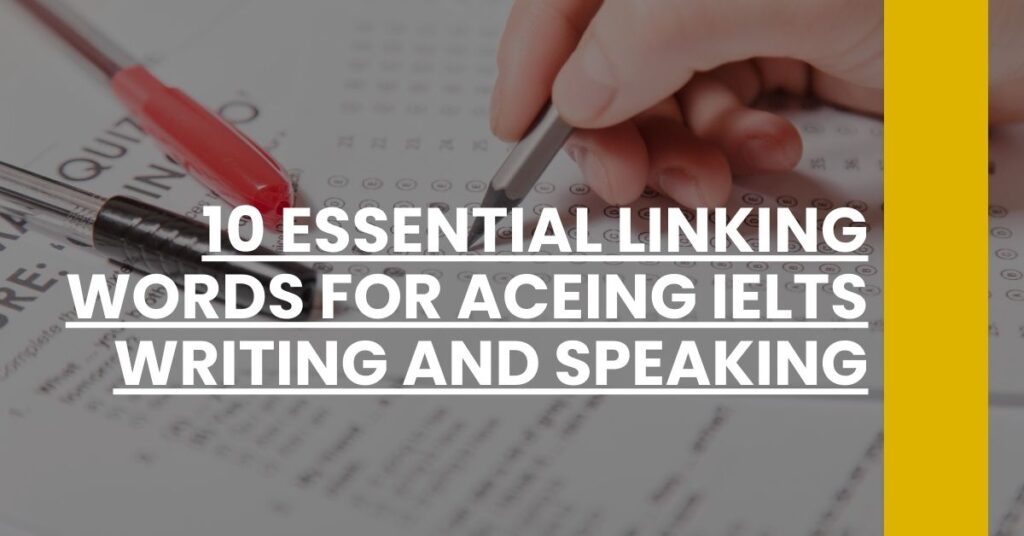Struggling to connect your ideas in IELTS essays or improve fluency in speaking?
Linking words for IELTS are your secret weapon. Our guide reveals how the right mix of conjunctions and connectives effortlessly bridges your thoughts, giving you the edge in achieving a higher band score.
Unlock the potential of each sentence with our expert tips on effective linking.
- 1. Addition Linkers: Building on Points
- 2. Contrast Connectives: Balancing Arguments
- 3. Cause and Effect Phrases: Explaining Relationships
- 4. Sequencing Words: Organizing Ideas
- 5. Illustrative Language: Giving Examples
- 6. Opinion Phrases: Expressing Views
- 7. Emphasizing Terms: Highlighting Key Points
- 8. Conditional Conjunctions: Discussing Possibilities
- 9. Summarizing with Linking Words
- Enhancing Coherence in IELTS Essays
- Common Pitfalls to Avoid with Linking Words
- Conclusion: Integration over Isolation
1. Addition Linkers: Building on Points
When you’re tasked with assembling a coherent essay or speech for your IELTS exam, the use of addition linkers is like having a Swiss Army knife in your linguistic toolkit. These small, yet mighty words and phrases usher clarity into your argument, paving the way for a well-structured and persuasive narrative.
- Extend Your Point: Terms like furthermore and moreover act as bridges, connecting one idea to another, underscoring the weight of your arguments.
- Introduce New Information: Utilize in addition or also to seamlessly introduce new pieces of evidence that support your main idea.
Incorporating such linking words for IELTS can make a significant impact. Rather than presenting disjointed thoughts, these connectors allow you to build a crescendo of ideas, demonstrating a sophisticated understanding of the topic at hand — a skill that can lead to a higher band score.
2. Contrast Connectives: Balancing Arguments
Contrast connectives act as a balancing act in your IELTS writing and speaking, where presenting two sides of a coin is often necessary to convey a nuanced perspective.
- Contradict Gracefully: Words such as however and nevertheless signal a shift in thought, gently bringing in an opposing view without jarring the reader.
- Present Alternatives: Phrases like on the other hand offer a platform for a different perspective, enriching your argument.
- Contrast with Conditions: Although and even though introduce conditions that do not derail the initial assertion but give it depth.
Careful use of phrases from experts on IELTS coherence demonstrates that injecting contrast while maintaining a thread of continuity can sway your examiner towards a favorable outcome. Remember, these linking words should guide your audience through your argument like a skilled dancer leading a partner across the dance floor — with purpose, precision, and poise.
3. Cause and Effect Phrases: Explaining Relationships
Explicitly stating the cause and effect in your responses is crucial, and specific linking words come to the rescue. They serve as signposts that guide the examiner through your narrative, illuminating the connections you’ve drawn.
- Clarify Causes: Use because or due to to point to the root of a situation.
- Highlight Effects: Transition phrases like as a result and therefore underscore the impact of previously mentioned points.
- Indicate Consequence: Thus and consequently bring forward the aftermath or results of an action.
The strategic application of these phrases can transform a flat, linear discussion into a dynamic exploration of causes and their cascading effects, just as recommended by IELTS preparation sources. Think of it as crafting a delicate narrative web, where each strand connects actions with outcomes in a way that is clear and compelling.
4. Sequencing Words: Organizing Ideas
To keep your ideas flowing in an orderly fashion, similar to chapters in a book, sequencing words are your secret weapon. They provide the reader with a sense of time, order, and progression.
- Kickstart a Sequence: Begin with firstly to set the stage for your ensuing points.
- Progress Through Points: Use subsequently to guide the reader or listener through the developing stages of your argument.
- Wrap it Up: Closing with finally signifies the coming together of your collective points, neatly packaging your ideas.
Align your verbal navigation with advice from communication guides, and you’ll find that a well-sequenced narrative not only resonates with your audience but also showcases your mastery over language organization — a critical element in achieving a high band score in the IELTS exam.
5. Illustrative Language: Giving Examples
If the devil is in the details, then victory is in the examples. Leveraging illustrative language through linking words for IELTS delivers concrete evidence to substantiate your claims, allowing you to shine in both writing and speaking modules.
- Sample Situations: Sprinkle your discourse with for instance or to illustrate to provide tangible instances.
- Support Arguments: Use phrases like for example to flesh out your viewpoints with specific examples that bolster your case.
- Enumerate with Precision: When listing multiple examples, such as and namely help you keep your rundown crisp and clear.
It’s a technique encouraged by language learning tools, emphasizing the power of examples to not only convey your point but to do it in a way that aligns with the nuanced expectations of IELTS examiners—transforming abstract concepts into palatable bites of information.
6. Opinion Phrases: Expressing Views
Presenting your opinion without coming across as rigid or dogmatic is a delicate art, especially in IELTS writing and speaking tasks. Opinion phrases grant you the freedom to assert your perspective, while still remaining open to discussion and reflection.
- State Your Belief: Begin with I believe or It is my belief to present your standpoint with conviction yet an air of humility.
- Offer Personal Insight: Use in my view or from my perspective to inject personal insight into your argument, giving it a unique edge.
- Suggest Tactfully: It seems to me that is a phrase that softly proposes your viewpoint, inviting consideration without demanding agreement.
Taking a page from the IELTS speaking tactics, employing these opinion phrases strategically positions you not just as a language user but as an informed individual capable of nuanced thought — a quality that scores points both literally and figuratively in the exam.
7. Emphasizing Terms: Highlighting Key Points
When you aim to make certain aspects of your writing stand out, emphasizing terms play a pivotal role. Just like a skilled photographer uses focus to draw attention to the main subject, you can use specific linking words to spotlight the most crucial parts of your discourse. Your choice of emphasis can significantly influence the reader’s perception and retention of what’s essential.
- Direct Attention: By introducing an important point with in particular, you guide your audience to pay close attention to what follows.
- Stress Importance: Utilize especially or specifically to pinpoint a crucial piece of information that might alter the interpretation of your argument.
- Highlight Significance: Terms like notably signify that what you’re about to say packs a punch – it’s something your reader shouldn’t miss.
Incorporating such terms can be as impactful as the strategic placement of keywords in SEO. You are not just filling space; you are strategically placing signposts that spotlight critical junctures in your narrative. It is these nuances that make the difference between a piece of writing and a compelling story that resonates with your reader. Just as infographics can enhance data visualization, emphasizing terms can enhance the clarity and persuasiveness of your IELTS responses.
8. Conditional Conjunctions: Discussing Possibilities
Discussing hypothetical situations or future possibilities can add depth to your responses in the IELTS exam. Conditional conjunctions are the bridges that connect the present to the imagined, and they’re indispensable when you need to demonstrate conditional logic or speculative reasoning.
- Speculate with Clarity: Use if to introduce possible conditions, paving the way for an explanation of potential outcomes in a straightforward manner.
- Set Conditions or Limitations: Unless sets a boundary or limitation, creating a scenario that hinges on a certain condition being met or unmet.
- Outline Specific Preconditions: With provided that, you emphasize that your situation is contingent on specific criteria being fulfilled.
These linking words craft the framework for well-rounded discussions that explore various scenarios, enhancing your ability to think critically and express complex ideas. It’s the kind of linguistic dexterity that shows command over English usage, a skill highly valued by IELTS examiners.
9. Summarizing with Linking Words
Summarizing concepts is a skill that demonstrates your ability to distil the essence of your discourse. It is here that summarizing linking words become instrumental, much like the conclusion section of a well-researched article.
- Wrap-up Your Thoughts: Phrases like in summary serve to cue the reader that what follows is the crux of your discussion.
- Lead into Conclusions: The use of in conclusion signals that you are tying together all the threads of your argument to present a final viewpoint.
- Global Statements: Overall is a versatile tool for crafting overarching statements that encapsulate the central theme of your response.
Thoughtful use of these phrases can turn a heap of points into a neat package, presenting your argument in a way that is digestible and impactful. It is similar to creating a strong meta description in the digital world: you’re providing a snapshot that convincingly captures the core message of your content.
Enhancing Coherence in IELTS Essays
Achieving a coherent and fluent essay isn’t just about using the right linking words for IELTS; it’s also about the less visible threads that hold your narrative fabric together. Here’s how you can weave a tapestry of coherence that impresses the most discerning examiner:
- Parallelism in Structure: Leverage parallel structures in your sentence construction to establish a rhythm that makes your essay more readable and polished.
- Purposeful Paragraphing: Each paragraph should house a singular, coherent idea, ensuring your essay has a clear, logical flow.
Remember, linking words are the thread, but the way you stitch your ideas together determines the final design. It’s the blend of coherence strategies that transforms your essay from a mere collection of words to a compelling piece of communication.
Common Pitfalls to Avoid with Linking Words
Using linking words requires a deft touch. Becoming too reliant on them or misusing them can trip up your IELTS performance rather than elevating it. Here’s what to watch out for:
- Overuse: Don’t string too many linking words together; they’re meant to enhance, not overwhelm your argument.
- Redundancy: Avoid using linking words that add no meaningful transition or clarification to your sentences.
- Incorrect Application: Misapplying linking words can confuse the reader and disrupt the flow of your essay or speech.
Navigating the common pitfalls of linking words is much like avoiding SEO blackhat techniques; both require a balance and understanding of rules to excel. By steering clear of these common errors, as illustrated by IELTS professionals, you ensure that your linking words serve their intended purpose: to clarify and articulate your thoughts in a cohesive, coherent manner.
Conclusion: Integration over Isolation
To truly capitalize on linking words for IELTS, remember that integration trumps isolation. These words are not just decorative constructs; they’re functional tools that link your thoughts elegantly and effectively.
Embracing them requires practiced integration into your verbal and written English skills. This is a nuanced art, similar to optimizing web content with keywords. The goal is flow, not force; synergy, not segments. The seamless weave of your narrative with the right linking words can be the very pivot that propels your IELTS score to its peak potential.
Therefore, think of linking words as the magnets that draw your ideas closer, connecting them in a way that resonates logically and emotionally with your audience. With diligent practice, you can make linking words intrinsic to your communication repertoire, ready to support and enhance your IELTS journey.
Explore top linking words for IELTS to boost your writing and speaking coherence. Master essential connectors for higher scores.

